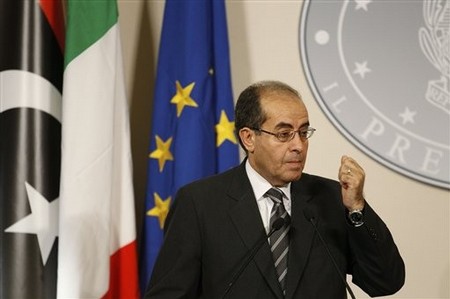Libya's rebels say they support Western values. Do they?

Anne-Marie Slaughter feels vindicated:
Before we focus on what must happen next, let us pause for a minute and reflect on that initial debate and the lessons to be learnt.The first is that, against the sceptics, it clearly can be in the US and the westâ??s strategic interest to help social revolutions fighting for the values we espouse and proclaim. The strategic interest in helping the Libyan opposition came from supporting democracy and human rights, but also being seen to live up to those values by the 60 per cent majority of Middle Eastern populations who are under 30 and increasingly determined to hold their governments to account.
It's true that the National Transitional Council has a constitution that espouses liberal values, but what of it? Does that tell us anything about how they'll govern (or whether they'll even be able to govern)? It's not to cast aspersions on the views espoused by the NTC to note that rhetorical commitments to liberal values are easy to make, especially if you need outside help from people likely to be motivated by appeals to liberal values. The NTC's commitments may be genuine, but they are completely untested and could be swamped by rival forces and dynamics.
But there's something even more curious about Slaughter's argument. She insists that we fought for liberal values, but then disavows attempting to see those values enshrined in a post-Gaddafi Libya:
Looking forward, it is really not up to the west, much less the US, to plan Libyaâ??s transition. It is a relief to see so many articles and statements reflecting lessons learnt from Iraq. But the Libyans are far ahead of where the US was when the initial fighting ended in Iraq. The National Transitional Council has a draft constitutional charter that is impressive in scope, aspirations and detail â?? including 37 articles on rights, freedoms and governance arrangements.
But what if this impressively scoped constitution crumbles under the weight of insecurity or tribal in-fighting? If intervening in Libya's revolution was done to further liberal values, what is our obligation to see that those values get embedded in the country? Slaughter's response is that it's better than Gaddafi's continued rule, but from America's perspective, Gaddafi's rule in 2011 wasn't a pressing national security issue. Gaddafi deserves the hangman's noose for his crimes, but it's not America's place to be the world's judge, jury and executioner when the moral sensibilities of its leading Wilsonians are inflamed.
(AP Photo)











